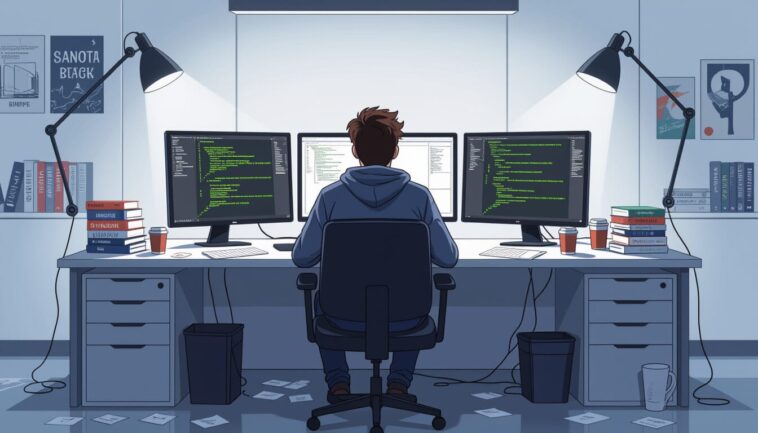In the grand tradition of technological innovation solving problems that didn’t exist while creating catastrophes that definitely do, the software engineering profession has undergone what historians will undoubtedly call “The Great Compression” – a miraculous feat of time-space manipulation that has condensed four years of computer science education into what can only be described as a TikTok attention span.
It was the best of times for venture capitalists, it was the worst of times for anyone who actually had to maintain the code afterward!
The Aristocrats of Algorithms
There was once a golden age when computer scientists walked among us like digital demigods, their pocket protectors gleaming with the authority of advanced mathematics and their understanding of Big-O notation striking fear into the hearts of mere mortals. These were the Brahmin of bytes, the nobility of nested loops, commanding respect and salaries that could fund small remote island nations.
Then came the Great Disruption, as Mark Zuckerberg – that hoodie-clad herald of social media apocalypse – made coding cool again. Suddenly, every twenty-something with a MacBook and a dream of “changing the world” (by creating yet another food delivery app) wanted to join the coding aristocracy. The flood gates opened, and with them came the inexorable logic of supply, demand, and human impatience.
The Educational Time Warp
What followed was perhaps the most aggressive compression of human knowledge since someone decided that assembling IKEA furniture shouldn’t require an engineering degree. The four-year computer science program – a relic of an age when people had the audacity to think deeply about problems – suddenly seemed as antiquated as asking users to read terms and conditions.
“Why spend four years learning the theoretical foundations of computation when you could spend twelve months learning to copy-paste from Stack Overflow?” reasoned the market, with the cold efficiency of an algorithm optimizing for quarterly profits rather than long-term civilizational stability.
But twelve months? In startup time, that’s approximately seventeen pivots and three complete rewrites of the business model. The coding bootcamps compressed further: six months of intensive training, because apparently the human brain is like a smartphone – you can just download new skills with a software update.
Then from nowhere, three months became the new standard, a pedagogical sprint that would make Olympic runners weep with admiration. And finally, inevitably, we arrived at the promised land: ten-hour YouTube tutorials promising to transform coding novices into full-stack developers faster than you can say “subscribe and hit that notification bell!“
These digital snake oil salesmen, armed with thumbnails featuring shocked faces and arrows pointing at code, discovered what educators had somehow missed for centuries: the secret to learning isn’t understanding, it’s maximizing watch time for ad revenue. Revolutionary!
The AI Coding Assistant Menagerie
Enter the AI coding assistants, stage left, accompanied by the sound of a thousand venture capital checks being signed simultaneously. Cursor, Replit, Bolt, Loveable (yes, that’s actually a name someone got paid to think up), Whisper, GitHub Copilot, VS Code integrations – a veritable menagerie of artificial intelligence, each promising to be the final nail in the coffin of human cognitive effort.
The behavior of developers faced with this cornucopia of digital assistance has been nothing short of anthropologically fascinating. Like digital nomads of code, they migrate from one AI coding assistant to another with each large language model update, carrying their hopes and dreams (and technical debt!) from platform to platform in an eternal quest for the perfect artificial pair programmer.
“GPT-5 just dropped!” becomes the battle cry, followed by mass exodus from whatever tool they were using yesterday, because apparently loyalty in the age of AI has the half-life of a trending hashtag.
The Prophets of Doom and Quarterly Earnings
Meanwhile, the marketing machinery of Silicon Valley has discovered its new favorite narrative: “AI will replace junior developers.” It’s a story so compelling, so perfectly crafted for maximum anxiety generation, that it’s spread faster than a zero-day exploit through an unpatched system.
The beauty of this narrative is its elegant simplicity. Technology companies spend more on engineering salaries than on kombucha and standing desks combined (and that’s saying something). The promise of replacing expensive humans with cheap artificial intelligence is more intoxicating than free energy drinks in the break room.
But here’s where the plot thickens, like code comments that nobody ever writes: experienced engineers and managers – those battle-scarred veterans who’ve survived multiple JavaScript framework cycles – can distinguish between genuine innovation and marketing hype better than a spam filter can detect Nigerian prince emails.
The real casualties are the younger generation, those 18-22-year-olds who take corporate messaging at face value (rookie mistake in an industry built on “move fast and break things”). Faced with the apocalyptic prophecy that robots will steal their future jobs, many are making the entirely rational decision to pursue careers in fields that can’t be automated, like artisanal cheese making or TikTok influencing.
The Great Irony of Talent Scarcity
Amazon’s CEO, in a moment of clarity that rivals finding a bug-free software release, recently declared that it makes no sense to stop hiring junior developers. His logic is devastatingly simple: fewer juniors today equals fewer seniors tomorrow. It’s basic arithmetic, the kind they apparently don’t teach in 10-hour coding bootcamps.
But the industry finds itself caught in a paradox more twisted than a recursive function without a base case. Companies refuse to invest in training junior developers (training costs money, and money is for buying more AI tools), yet simultaneously complain about talent shortages with the indignation of someone discovering their coffee machine requires actual coffee beans.
This creates a feedback loop more vicious than user comments on a poorly designed interface. The few companies that do invest in training find their newly skilled developers immediately poached by competitors who’ve perfected the art of reaping without sowing. It’s capitalism’s answer to the tragedy of the commons, except the commons is human expertise and the tragedy is that nobody wants to pay for it.
The Historical Echo Chamber
Those with longer memories (a rare commodity in an industry that considers anything older than six months to be “legacy”) might recall that we’ve been down this road before. First, there was the great offshoring movement – why pay Silicon Valley salaries when you can pay Bangalore prices? Then came the age of outsourcing – why manage employees when you can manage contracts?
Each solution promised to be the golden ticket, the final answer to the eternal question of how to build software faster and cheaper. Each created new problems that required new solutions, in an endless cycle more predictable than JavaScript framework churn.
Now we stand at the threshold of the AI revolution, convinced this time will be different, this time we’ve cracked the code (pun absolutely intended!). The early adopters will pay the costs of errors, debugging AI-generated code that works perfectly until it doesn’t, troubleshooting systems that fail in ways no human programmer would ever conceive.
Some will win, some will lose, and eventually, when everyone has AI coding assistants, the playing field will level out once again. Then the industry will return to its eternal quest: finding new ways to cut costs while complaining about the quality of the workforce they refuse to invest in developing.
The Inevitable Tomorrow
And so we find ourselves in this peculiar moment, watching an industry that moves at the speed of light somehow manage to be remarkably short-sighted. The same companies that plan product roadmaps years in advance seem unable to grasp that software developers, like fine wine or good code documentation, require time to mature.
The great developer compression continues, each cycle promising to extract more value from less training, more capability from less understanding, more innovation from less investment in human potential. It’s efficiency at its finest, assuming you don’t mind the occasional complete system failure or the gradual erosion of deep technical knowledge.
Perhaps future generations will look back at this era with the same bemused confusion with which we regard medieval alchemists trying to turn lead into gold. Except in our case, we’re trying to turn YouTube videos into senior software engineers, which, when you think about it, might be the more ambitious transformation.
What do you think – are we witnessing the democratization of coding or the death of deep technical knowledge? Have you jumped ship between AI coding assistants lately, and if so, what was your breaking point? Is the industry’s obsession with reducing training time creating a generation of developers who can implement features but can’t understand why they work?




GIPHY App Key not set. Please check settings